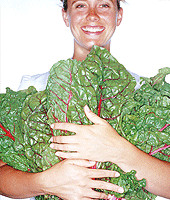Advertisement
Science of Food Storage: Produce
Freshness! We all want it from the foods we eat. “Fresh,” say the tags on fruit and vegetable bins in the grocery store. But how long does fresh food stay fresh? Unfortunately, any type of storage results in some deterioration. Produce on store shelves has already begun to lose vitamins, and nutrient losses multiply each … Continued
 Freshness! We all want it from the foods we eat. “Fresh,” say the tags on fruit and vegetable bins in the grocery store. But how long does fresh food stay fresh?
Freshness! We all want it from the foods we eat. “Fresh,” say the tags on fruit and vegetable bins in the grocery store. But how long does fresh food stay fresh?
Unfortunately, any type of storage results in some deterioration. Produce on store shelves has already begun to lose vitamins, and nutrient losses multiply each day. Wilting is a sure sign of nutrient loss, especially of climate-sensitive vitamin C (ascorbic acid). Lettuce, kale, chard and other leafy greens that are prone to wilting register a higher ascorbic acid reduction after several days of optimal cold storage than does cabbage, which is more resistant to wilting. Green beans lose 58 per cent of their original ascorbic acid during the first three days of refrigeration after harvesting.
While a certain amount of nutrient loss is inevitable, we can minimize it by purchasing the freshest possible produce and storing it under optimal conditions.
Refrigerate all leafy greens such as lettuce, dandelion, collards, mustard greens, chard, watercress and broccoli. They keep best when wrapped in plastic to prevent loss of moisture and vitamins. Cucumbers and eggplant, however, are best stored in paper bags in the crisper to protect against excess cold temperatures that cause the development of pitted, mushy spots.
Refrigerate carrots or store in a cool place in perforated bags or containers to allow air circulation. This prevents the formation of terpenoids, which give carrots a bitter taste. Protected from heat and light, carrots retain their nutrients for up to seven months. Their beta-carotene actually increases during the first five months of storage, then remains stable for two months before decreasing.
Store potatoes in a root cellar or dark, dry, and cool cupboard to prevent sprouting and mold growth. They will keep for several weeks. Potatoes stored too warm will develop dark spots and wilted skins. Potatoes that have been refrigerated turn dark more quickly after cooking. Taking them out of the fridge several hours before cooking can prevent this. Store winter squash in the same way.
Tomatoes tend to lose flavour if refrigerated. They are best stored loosely in a basket that permits air to circulate. Unripe tomatoes should be stored on a counter or on top of the fridge, which allows the ripening process to continue. Any type of produce that continues to ripen after picking, including unripe pears, peaches, and plums, must not be refrigerated. These should be stored in a brown paper bag at room temperature until ripe.
Citrus fruits may be stored at room temperature for several days and will last for up to two months if refrigerated. Apples must always be refrigerated. They will keep for several months, but gradual loss of nutrients, especially vitamin C, still occurs with lengthy storage. Store apples away from vegetables, or keep them in a plastic bag, as they give off ethylene gas as they ripen, promoting spoilage of other produce.
In a busy world where few folk have the time to shop for produce daily, we need to maximize storage options so we can derive optimal freshness and nutrition from all our fruits and veggies.




